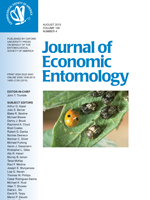Soil-dwelling insects are severe pests in many agroecosystems. These pests have cryptic life cycles, making sampling difficult and damage hard to anticipate. The management of soil insects is therefore often based on preventative insecticides applied at planting or cultural practices. Wireworms, the subterranean larvae of click beetles (Coleoptera: Elateridae), have re-emerged as problematic pests in cereal crops in the Pacific Northwestern United States. Here, we evaluated two management strategies for wireworms in long-term field experiments: 1) treating spring wheat seed with the neonicotinoid thiamethoxam and 2) replacing continuous spring wheat with a summer fallow and winter wheat rotation. Separate experiments were conducted for two wireworm species—Limonius californicus (Mannerheim) and Limonius infuscatus (Motschulsky). In the experiment with L. californicus, spring wheat yields and economic returns increased by 24–30% with neonicotinoid treatments. In contrast, in the experiment with L. infuscatus, spring wheat yields and economic returns did not increase with neonicotinoids despite an 80% reduction in wireworms. Thus, the usefulness of seed-applied neonicotinoids differed based on the wireworm species present. In experiments with both species, we detected significantly fewer wireworms with a no-till summer fallow and winter wheat rotation compared with continuous spring wheat. This suggests that switching from continuous spring wheat to a winter wheat and summer fallow rotation may aid in wireworm management. More generally, our results show that integrated management of soildwelling pests such as wireworms may require both preventative insecticide treatments and cultural practices.
How to translate text using browser tools
1 August 2015
Effects of Neonicotinoids and Crop Rotation for Managing Wireworms in Wheat Crops
Aaron D. Esser,
Ivan Milosavljević,
David W. Crowder
ACCESS THE FULL ARTICLE
It is not available for individual sale.
This article is only available to subscribers.
It is not available for individual sale.
It is not available for individual sale.

Journal of Economic Entomology
Vol. 108 • No. 4
August 2015
Vol. 108 • No. 4
August 2015
crop rotation
Elateridae
neonicotinoid
soil-dwelling pest
wheat




